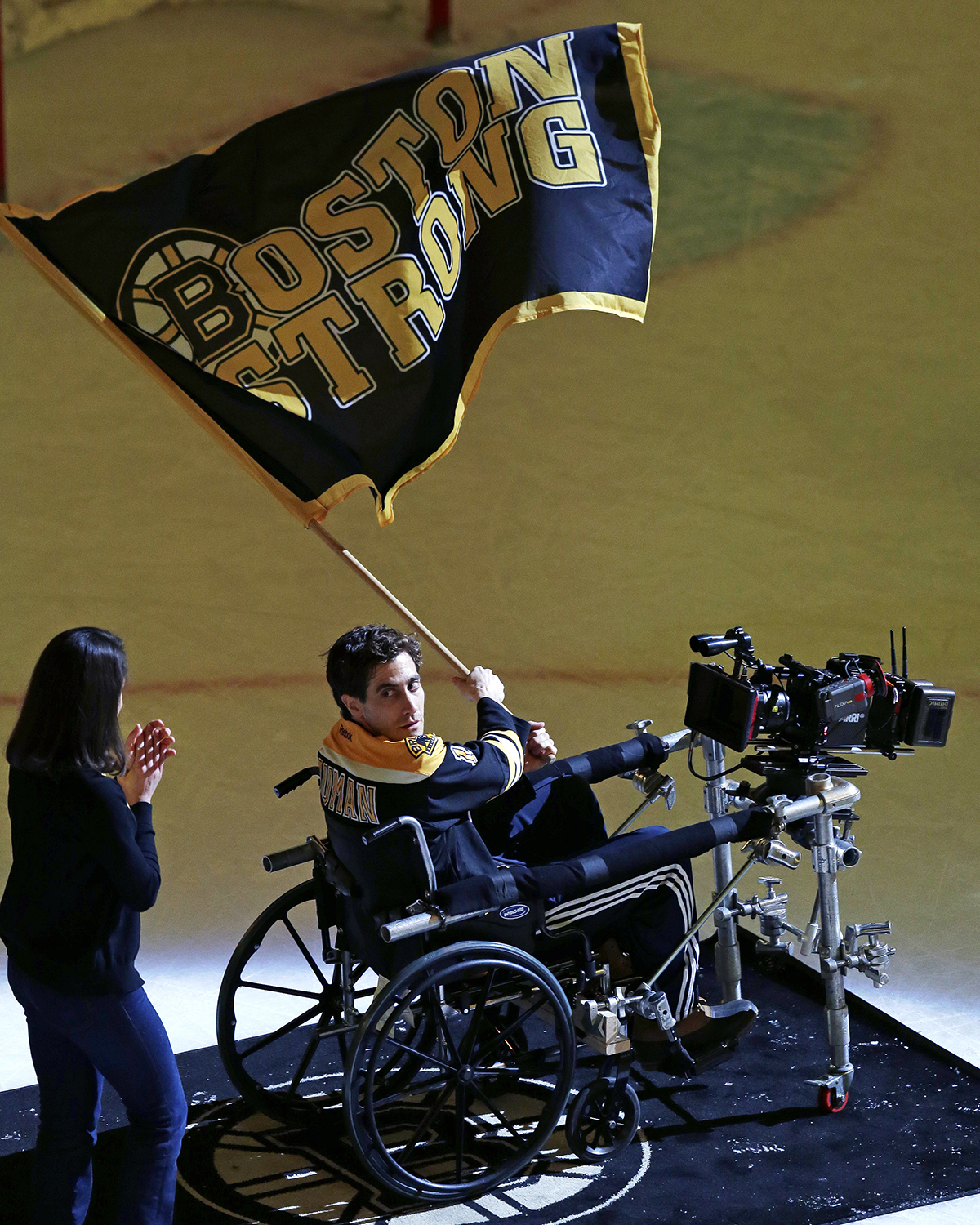What Will It Take for Hollywood to Cast More Actors with Disabilities?

Photo via AP
Last month, on the third anniversary of the Boston Marathon bombings, Jake Gyllenhaal and Jeff Bauman threw out the first ceremonial pitches for the Fenway home opener. Most of you know of actor Gyllenhaal, but outside of Boston, many may not recognize Jeff Bauman’s name. That’s about to change.
Bauman, who lost both of his legs in the marathon bombings, wrote the memoir Stronger that is now being made into a movie starring Gyllenhaal as Bauman. As a Bostonian, I am glad to see that stories of strength and perseverance in the aftermath of that heinous terrorist attack have reached all the way to Hollywood. And I sincerely congratulate Bauman on the success of his memoir. However, I see the casting of Gyllenhaal in this movie as a symptom of a little-discussed problem.
I can say nothing against Gyllenhaal’s star power and talent—he is undoubtedly one of the best-known and skillful actors of our time—but I don’t understand how we can uncritically accept that he, as an able-bodied man, will play a man with amputated legs. If Jeff Bauman were a black man, we would have seen backlash akin to the uproar against Scarlett Johansson playing an Asian woman in Ghost in the Shell, or akin to Zoe Saldana artificially darkening her skin to play Nina Simone in Nina. But there was no such public outcry in the casting of Gyllenhaal as Bauman.
It seems that Hollywood’s exclusion of actors with disabilities is so entrenched that it not only doesn’t draw public censure, but it doesn’t even warrant lip service. Even in her statement on the need for inclusion in Hollywood, Academy of Motion Picture Arts and Sciences president Cheryl Boone Isaacs said that “[i]n 2016, the mandate is inclusion in all of its facets: gender, race, ethnicity and sexual orientation,” completely leaving out disability. That is simply unacceptable. If we are to have a movie industry that represents the people whose stories it’s telling, we cannot shut out a fifth of all Americans.
And the problem here isn’t that the Academy is unaware that people with disabilities exist. After all, it’s widely accepted that playing disability is Oscar-bait. Since 1988, 14 of the 27 Oscars for best actor went to men who played a character with a severe illness and/or disability. That is more than half! It is clear that the Academy welcomes characters with disabilities with wide-open arms. But what it sadly doesn’t welcome at all are actual human beings with disabilities. Not a single one of those Oscar-winning actors had the disability they played—or any other visible disability for that matter.
By comparison, the number of people with disabilities who have ever won an Oscar is only three. As actor Danny Woorburn writes in his recent Huffington Post article, people with disabilities make up less than two percent of the film and television industries. I suspect that the number would be higher if all those with so-called invisible disabilities would come forward, but it certainly would not be much higher. And their silence, along with this abysmally low percentage, is just a symptom of the disgraceful problem of ableism in Hollywood.
Many articles have been written in recent years trying to explain this bizarre phenomenon. Playwright Christopher Shinn described one of those arguments well in the Atlantic when he wrote:
[i]t is reassuring for the audience to see an actor like Daniel Day Lewis, after so convincingly portraying disability in My Left Foot, get up from his seat in the auditorium and walk to the stage to accept his award. There is a collective “Phew” as people see it was all an illusion. Society’s fear and loathing around disability, it seems, can be magically transcended.
In this way, using able-bodied actors to portray disability on screen results in a paradoxical erasure of people with disabilities. Rather than actually acknowledging that people with disabilities can be as remarkable and successful as they are portrayed to be in My Left Foot, or The Theory of Everything, and now in Stronger (all of which are based on real people), audiences end up admiring an actor’s range. For all intents and purposes, Hollywood makes it seem like disability is something that does not really exist off-stage, behind the scenes, and in real, human lives.
Critic Scott Jordan Harris frequently makes the argument that an able-bodied actor playing a character with disabilities is like blackface. He calls it “cripface.” Many critics are outraged by this comparison, but I’m not sure it’s so far off the mark. In 1965, Laurence Olivier won an Oscar for playing Othello in blackface. We cringe at this today. Maybe in 2039, 50 years after Daniel Day Lewis won his Oscar for My Left Foot for playing a character with cerebral palsy, we’ll look back and be equally horrified.
But to get to this future where it’s a given that people with disabilities deserve self-representation on the screen, and everywhere else, we need to start sending clear messages to Hollywood and the Academy. Demand that Boone Isaacs include disability in her list of facets that require inclusion. Don’t support movies that cast able-bodied actors when an actor with a disability could have done the job. Whenever the movies tell a story that denies self-representation, we as the audience need to remind Hollywood that we are indeed living in 2016 and that they can, and need to, do better.
Jay Ruderman is president of the Ruderman Family Foundation, an advocacy organization focusing on inclusion of people with disabilities. You can reach him at @jayruderman.


